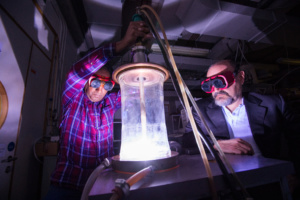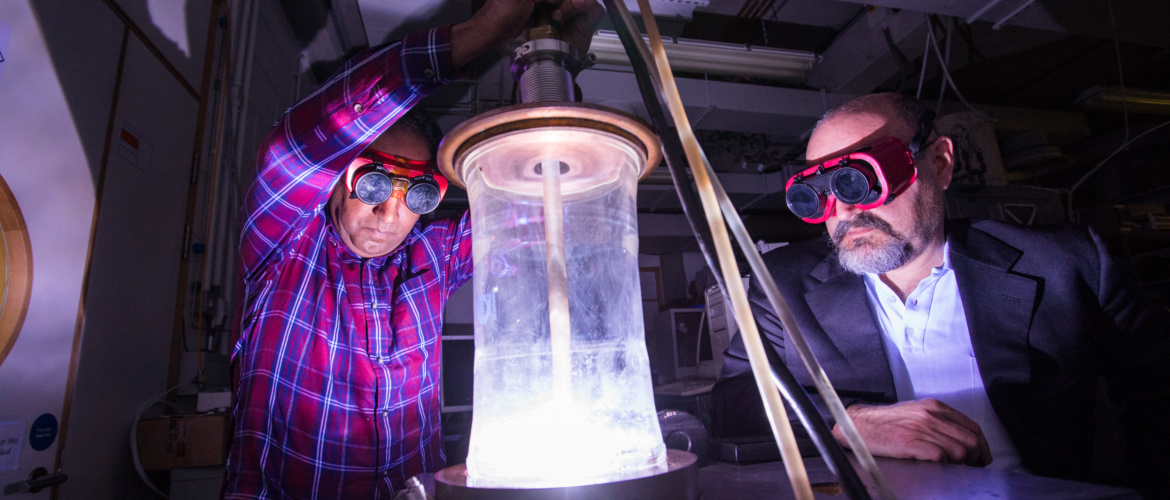An international collaboration led by Prof Stefano Sanvito, Director of the CRANN Institute at Trinity College Dublin and Investigator in the Science Foundation Ireland funded centre AMBER, and comprising the groups of Prof. Coey, also at CRANN, and of Prof. Curtarolo at Duke University, has discovered 22 new magnets at a speed 20 times faster than that achieved in the last 2,000 years. The team has demonstrated that advanced computer simulations combined with powerful databases can predict the chemical composition of new magnets, and proved in the lab that these can be made. Among others the group has successfully fabricated two of such new magnets, with one displaying a remarkably high ordering temperature. The discovery paves the way for materials design at an unprecedented speed.
The love affair between humanity and magnetic materials has been continuing for two thousand years and does not show any sign of loosing steam. From the invention of the compass, which enabled the 11th century Chinese Song dynasty to embark in long-distance navigation, magnetic materials have been key for human technology. Today magnets are everywhere in our life. The hard disk of our computer is composed by billions tiny magnets, wind turbines are made by strong permanent magnets, and so are the electrical motor in our cars, in our kitchen blender and in our lawn mower. Even show business has noticed magnets, with the most popular villain of the X-men saga being the metal-controlling Magneto.

Yet, nature is stingy when it comes to magnets. The first report of a magnetic material dates back to 79AD and it is contained in what is probably the first scientific encyclopaedia ever, the Naturalis Historia (Natural History) by Plinius the Elder. In the Historia Plinius, who perished in the eruption of the Vesuvio in 79AD, reports the discovery by “Magnes the shepherd” that two metallic stones attract each other. It took then about 2,000 years to understand the microscopic origin of magnetism, which was possible only after the formulation of quantum mechanics. In all this time we have discovered about 2,000 materials, which behave as magnets, namely our discovery speed is one magnet per year.
In an article just appeared in the prestigious journal Science Advances Sanvito and his team have demonstrated that such discovery speed can be accelerated by twenty times. The team has used advanced computer simulations to generate a database containing the calculated properties of 300,000 new hypothetical materials. Then they have established which of these have strong chances to be fabricated and preceded with the synthesis of the most promising. Thus in only one year they have predicted 20 new materials and fabricated two. One of them, Co2MnTi, displays an ordering temperature of about 940 degrees (a magnet looses its magnetic properties for temperatures above the ordering temperature). This is a remarkable discovery in itself since no more than two dozens among the previously known magnets remain magnetic at such high temperature. The protocol designed by Sanvito and his team can be applied to other materials classes beside magnets, effectively opening an avenue for fast rationale materials discovery.
See the original article in Science Advances:
You can listen to Stefano talking about this at ScienceTechnology. today
See also some press releases:
RTE News
The Irish Times
The Irish Times
Eureka Magazine
NewAtlas.com
Silicon Republic
EngineersJournal.ie
Science Daily
Institute of Materials, Minerals and Mining
Funvive.com
AimMagnet
Phys.org
Engineering.com
ScienceAlert.com
Azo Materials
NextBigFuture.com
Futurism.com
International Business Times
CRANN
AMBER
Duke University
See also some Blogs talking about it(some comments are funny …):

